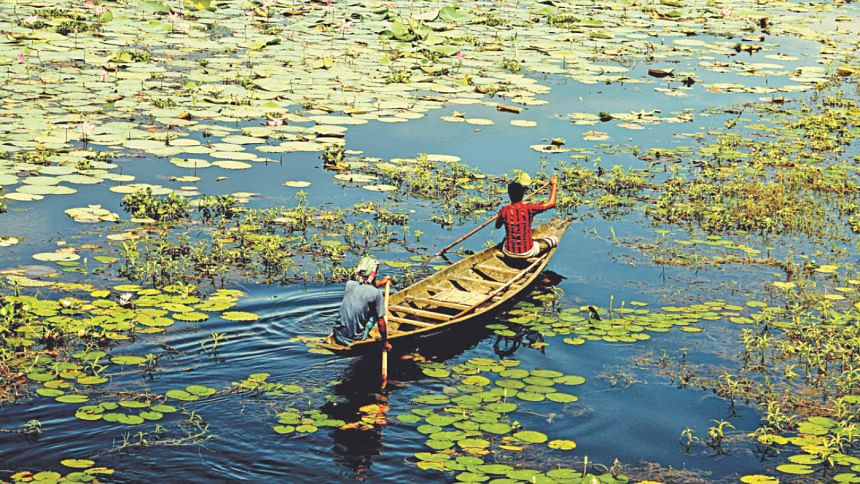Nature Quest: Into the magic, mystique of Hail Haor

The sun was still far above the horizon, casting its deep copper light over the land. We walked down a narrow, dusty earthen village road with green rice fields on both sides. A farmer with his last load of the day, or a farmer's wife carrying a late lunch to her husband, who is out working on the fields. The magnificent light making those mundane images almost magical! Soon the deep green fields, where the drongos played incessantly, disappeared and all we could see was water and the great expanse of water we know as the Hail Haor had started. The water-buffalos, with friendly Little Egrets perched on top of them, were still half submerged under the water which stretched to infinity and touched the horizon, above which the bright ball of flame hovered. The late-afternoon sun was making final preparations to bid adieu for the day. The shepherds brought back their water-buffalos home after bathing them in the haor, with mud caked on the bodies of the enormous beasts! The fishermen were returning in twos and threes and sometimes alone, in their small dinghies cutting through the blooming lotuses and water hyacinths, with whatever little catch they could collect for the day.
The road grew narrower and narrower and finally, just like that, it ended. At the end there were two rickety dinghies waiting for our arrival. As we stepped onto it, the boats swayed tilting and threatening to throw us off. The boatman handed a plastic bowl to me and I was instructed to sweep water off the bottom of the boat.
As the oars made splashing sounds, cutting in and out of the clear waters of the haor, we were off. The boats propelled forward leaving the last stretch of land behind. Our boatman started humming a tune of a haor song. The abrupt melancholic tunes, coupled with the sounds of the oars, triggered feelings that can hardly be described in words. Bright pink lotuses with their large floating leaves, mossy tendrils, and water hyacinths and the dark-yet-clear waters of the haor surrounded us as we moved deeper into a surreal realm.
We moved forward, our hearts heavy for reasons unknown when a shrill call brought us back to reality. We looked around, saw two Brahminy Kites fighting for a fish while another just swooped in and caught a fish on its own. We had been so engrossed with ourselves, we barely noticed the surrounding. As far as the eyes could see, there was water. Water birds of every species imaginable seemed to have taken over the haor. Marveled by this profusion of life, we immersed ourselves in the beauty of that magical place. The sun was inches about the horizon and the birds started to head home. Egrets and cormorants just few feet above our heads, sometimes silhouetted by the sun, with its rays shining gold on their backs, flying in perfect V-shaped formations, calling harshly and sending obscured shadows on the waters below, while the Pied Kingfisher pair was still trying to catch a meal, hovering over the water like they normally do. Disturbed by our boats, tiny frogs jumped from the floating lotus leaves in to the dark waters to vanish out of view while a Rat snake swam effortlessly by the bow of our boat.
The light cast by the sun -- half-buried in the distant horizon -- was mesmerising, painting the landscape in a metallic copper. Photographers dream of that light. Bamboo structures constructed by fishermen rose awkwardly through the waters with fishing nets expertly attached to the geometrical configuration. Little fishing boats tied alongside those structures and smoke billowing out of the boats where the dinner was being prepared. We called out to one of the fishermen to know if he was ready to brave the uncertain nights out. We asked about his catches for the day. He brought out a plastic bowl and inside it was his meager catch for a day. We asked what was for dinner and were astonished to have been invited to dinner, which we very politely and promptly declined. Feeding a group of six is utterly impossible for a poor fisherman of the haor as it would possibly mean squandering his entire catch of the day. It would mean that the fisherman would have to go hungry for the night and possibly the next day. The incident left us humbled. Even though that poor fisherman knew that he lacked the means to entertain such a large party of travellers, he went out of his way to make sure that a meal was provided for each of us!
As we slowly paddled away from the boats, I heard a fisherman humming an old familiar tune. A tune quite similar but entirely different to the one our boatman had sung earlier that day. As the song grew fainter and the remaining twilight vanished in darkness, myriads of frogs, crickets and foxes started their own orchestra. And I realised how everything in the world of haor is perfectly in tune.
The writer works on environment.

 For all latest news, follow The Daily Star's Google News channel.
For all latest news, follow The Daily Star's Google News channel. 



Comments